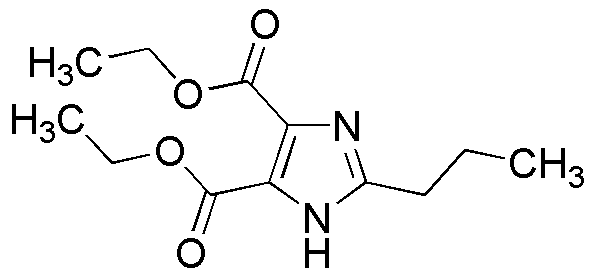Diethyl 2-propyl-1H-imidazole-4,5-dicarboxylate is widely utilized in research focused on:
- Pharmaceutical Development: This compound serves as a key intermediate in the synthesis of various pharmaceuticals, particularly in the development of drugs targeting neurological disorders due to its ability to modulate neurotransmitter systems.
- Agricultural Chemicals: It is used in formulating agrochemicals, enhancing crop protection products by acting as an effective fungicide or herbicide, which helps in increasing agricultural productivity.
- Biochemical Research: Researchers employ this compound in studies related to enzyme inhibition and metabolic pathways, providing insights into cellular processes and potential therapeutic targets.
- Material Science: Its unique chemical structure allows it to be used in creating advanced materials, such as polymers with enhanced thermal stability and mechanical properties, beneficial for various industrial applications.
- Analytical Chemistry: The compound is utilized as a reference standard in analytical methods, aiding in the accurate quantification of similar compounds in complex mixtures, which is crucial for quality control in manufacturing.
General Information
Properties
Safety and Regulations
Applications
Diethyl 2-propyl-1H-imidazole-4,5-dicarboxylate is widely utilized in research focused on:
- Pharmaceutical Development: This compound serves as a key intermediate in the synthesis of various pharmaceuticals, particularly in the development of drugs targeting neurological disorders due to its ability to modulate neurotransmitter systems.
- Agricultural Chemicals: It is used in formulating agrochemicals, enhancing crop protection products by acting as an effective fungicide or herbicide, which helps in increasing agricultural productivity.
- Biochemical Research: Researchers employ this compound in studies related to enzyme inhibition and metabolic pathways, providing insights into cellular processes and potential therapeutic targets.
- Material Science: Its unique chemical structure allows it to be used in creating advanced materials, such as polymers with enhanced thermal stability and mechanical properties, beneficial for various industrial applications.
- Analytical Chemistry: The compound is utilized as a reference standard in analytical methods, aiding in the accurate quantification of similar compounds in complex mixtures, which is crucial for quality control in manufacturing.
Documents
Safety Data Sheets (SDS)
The SDS provides comprehensive safety information on handling, storage, and disposal of the product.
Product Specification (PS)
The PS provides a comprehensive breakdown of the product’s properties, including chemical composition, physical state, purity, and storage requirements. It also details acceptable quality ranges and the product's intended applications.
Certificates of Analysis (COA)
Search for Certificates of Analysis (COA) by entering the products Lot Number. Lot and Batch Numbers can be found on a product’s label following the words ‘Lot’ or ‘Batch’.
*Catalog Number
*Lot Number
Certificates Of Origin (COO)
This COO confirms the country where the product was manufactured, and also details the materials and components used in it and whether it is derived from natural, synthetic, or other specific sources. This certificate may be required for customs, trade, and regulatory compliance.
*Catalog Number
*Lot Number
Safety Data Sheets (SDS)
The SDS provides comprehensive safety information on handling, storage, and disposal of the product.
DownloadProduct Specification (PS)
The PS provides a comprehensive breakdown of the product’s properties, including chemical composition, physical state, purity, and storage requirements. It also details acceptable quality ranges and the product's intended applications.
DownloadCertificates of Analysis (COA)
Search for Certificates of Analysis (COA) by entering the products Lot Number. Lot and Batch Numbers can be found on a product’s label following the words ‘Lot’ or ‘Batch’.
*Catalog Number
*Lot Number
Certificates Of Origin (COO)
This COO confirms the country where the product was manufactured, and also details the materials and components used in it and whether it is derived from natural, synthetic, or other specific sources. This certificate may be required for customs, trade, and regulatory compliance.


